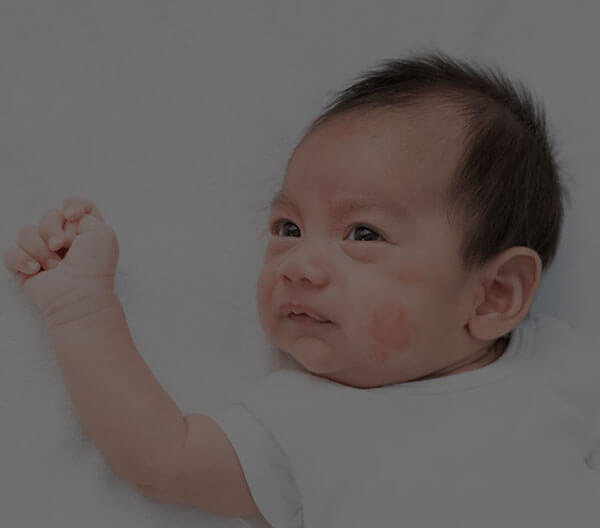
A skin allergy is a hypersensitivity reaction of the immune system to an allergen such as pollen, dander, dust etc. This leads to release of inflammatory mediators such as histamine, serotonin, bradykinin which leads to an inflammatory reaction. The allergy then manifests as a skin rash. Skin allergies are more common in infants with sensitive skin. Even irritants such as a dirty diaper, drool, food, soaps, and detergents can cause allergic reactions in children.
Heat rash, also known as prickly heat or miliaria, is a type of rash that occurs in newborns because their sweat glands, not fully developed, are easily blocked. “Instead of evaporating, perspiration remains trapped beneath the skin, causing inflammation and rash,” explains Dr sai sandeepthi.
Small, red to clear, pin-pointed bumps, usually over covered sites such as the back and buttocks.
Nappy rash, also known as diaper dermatitis, affects 35 % of babies at some point in their first year of life. Its incidence peaks at about 9-12 months of age.
A red, scaly rash over the areas of the skin that are covered by diapers.
Cradle cap, also known as seborrhoeic dermatitis, usually presents within the first few weeks of life and can recur for up to 4-6 months. “Cradle cap occurs due to an overgrowth of a normal skin fungus / yeast, secondary to stimulation from maternal hormones while the baby is still in the womb. However, in some babies, it may be an early sign of atopic dermatitis or atopic eczema,” says Dr. Sai sandeepthi.
Scaly, pink to red patches on the scalp. Sometimes, other areas of the body are also affected, e.g. the neck, armpits and groin. Areas can present with greasy skin covered with flaky white or yellow scales.
Atopic eczema, also known as atopic dermatitis, is the most common skin condition affecting adults and children, including babies. It affects up to 20 per cent of school-aged children in Singapore and for most patients, symptoms begin during the first year of life. “Most children with eczema improve as they get older. However, the condition can recur after months or even years. With good control, many patients with eczema can lead healthy, active lives,” says Dr. Sai Sandeepthi .
Patches of red, itchy, rough and dry skin, typically on a baby's cheeks and at the joints of the arms and legs
The exact cause of atopic eczema is unknown. Atopic eczema is an immune reaction and has a genetic basis, being found to run in families. Contributory factors which can act as triggers or worsen the condition include:
Environmental factors such as high temperatures, house dust mites, viral infections, vaccinations. Allergens such as soaps, creams, detergents
Most of the common newborn baby skin problems can be prevented by taking some simple precautions. Keeping the baby's skin clean and moisturized plays an important part in this. Here are some things you can do to prevent skin allergies:
Dress your baby in soft, cotton fabric all the time. Clothes made from synthetic materials can be itchy and rough besides being a source of allergens.
As mentioned above, most skin problems resolve with time and can be treated at home too. However, in some cases, consulting a doctor becomes necessary. If your baby develops a skin allergy and the rashes worsen over time, you should take him to a paediatrician. Sometimes, a rash can also signify some illness – in this case, immediate medical attention is required. If your baby has a fever, is crying continuously, or is lethargic, you should consult Our Expert doctor in Hyderabad .
A good deal of patience is required when dealing with skin allergies in babies. Prevention is the key when it comes to skin allergies. Try to keep your baby safe from skin allergies by maintaining good hygiene and keeping your baby’s skin clean and dry as much as possible.
